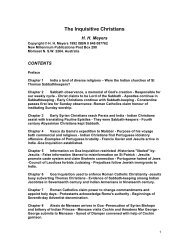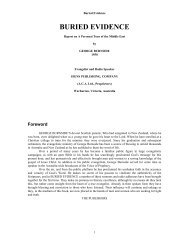Battle of the Bibles - Present Truth
Battle of the Bibles - Present Truth
Battle of the Bibles - Present Truth
You also want an ePaper? Increase the reach of your titles
YUMPU automatically turns print PDFs into web optimized ePapers that Google loves.
With Erasmus's translation, Tyndale knew that he now had a tool which had not<br />
been available to his predecessor, John Wycliffe, who some one and a half centuries<br />
earlier had questioned <strong>the</strong> infallibility <strong>of</strong> <strong>the</strong> pope and given to <strong>the</strong> English a Bible in <strong>the</strong>ir<br />
own language. Being a bald translation <strong>of</strong> <strong>the</strong> Roman Catholic Vulgate, it contained most<br />
<strong>of</strong> <strong>the</strong> errors <strong>of</strong> <strong>the</strong> Alexandrian line. His Bible preceded <strong>the</strong> invention <strong>of</strong> printing, so,<br />
being very expensive, it could only be read by a privileged few.<br />
Although Wycliffe has been justly called "The Morning Star <strong>of</strong> <strong>the</strong> Reformation",<br />
<strong>the</strong> world only caught a glimmer <strong>of</strong> <strong>the</strong> daybreak as his translation from a text favoured<br />
by <strong>the</strong> papal hierarchy was not able fully to penetrate <strong>the</strong> all-pervading fog <strong>of</strong> <strong>the</strong> Dark<br />
Ages.<br />
Tyndale knew that his cherished task would not be easy. England was still<br />
Roman Catholic. The reigning monarch, Henry VIII, was a Catholic and a staunch<br />
defender <strong>of</strong> ritualism. The pope had conferred on him <strong>the</strong> title, "Defender <strong>of</strong> <strong>the</strong> Faith"<br />
which <strong>the</strong> British sovereigns carry to this day. He had no time for Protestantism. Yet<br />
even he had been influenced by criticisms <strong>of</strong> <strong>the</strong> papacy by Colet and Erasmus<br />
When he eventually quarreled with <strong>the</strong> Roman hierarchy, it was more over<br />
political differences than religious ones. He was quite happy to maintain <strong>the</strong> ritualism<br />
and pomp <strong>of</strong> Catholic worship, but he refused <strong>the</strong> notion <strong>of</strong> papal authority over both<br />
church and state. Later, in 1534, <strong>the</strong> English parliament abrogated papal supremacy in<br />
favour <strong>of</strong> <strong>the</strong> King.<br />
The High Church <strong>of</strong> England even to this day reflects Henry's attitudes in that it is<br />
content to retain many Roman practices and beliefs, yet it does not acknowledge, at<br />
least outwardly, <strong>the</strong> authority <strong>of</strong> <strong>the</strong> pope.<br />
Henry VIII had done nothing to hinder <strong>the</strong> church's hostility to Wycliffe's English<br />
Bible and made no secret <strong>of</strong> his aversion to reformers like Lu<strong>the</strong>r. Tyndale realised that<br />
Henry would give him no support in a likely confrontation with <strong>the</strong> Catholic clergy.<br />
But in Germany, things were different. The invention <strong>of</strong> printing in Mainz in 1440<br />
enabled cheap and wide distribution <strong>of</strong> ideas. Already Lu<strong>the</strong>r's pronouncements and<br />
writings against <strong>the</strong> papal system were bearing much fruit. In 1522, Lu<strong>the</strong>r had been<br />
successful in bringing out his German-language New Testament. Tyndale determined to<br />
enhance his chances <strong>of</strong> producing an English Bible by exiling himself in Germany. In<br />
1524 he left his beloved homeland and settled down in Hamburg to <strong>the</strong> work <strong>of</strong><br />
translation.<br />
But <strong>the</strong> tentacles <strong>of</strong> Rome were long and strong. No sooner had Tyndale<br />
arranged to have his Bible printed in Cologne than he was forced to hurriedly ga<strong>the</strong>r up<br />
his precious manuscripts and flee with <strong>the</strong>m to Worms. There, in 1525, he was<br />
successful in having <strong>the</strong> New Testament printed, but he still <strong>the</strong> problem <strong>of</strong> getting <strong>the</strong><br />
<strong>Bibles</strong> into England where Catholic bishops had been influential in obtaining a blockade<br />
what was regarded as dangerous merchandise. And so it was− and remains to this day -<br />
in <strong>the</strong> eyes <strong>of</strong> popery.<br />
In order to circumvent <strong>the</strong> blockade, Tyndale's helpers were forced to invent<br />
ways to secrete <strong>the</strong> <strong>Bibles</strong> among items <strong>of</strong> merchandise. In this way, most <strong>of</strong> <strong>the</strong> <strong>Bibles</strong><br />
eluded seizure and <strong>the</strong> consequent sacrilege <strong>of</strong> a public burning. Indeed, one such<br />
burning took place in 1530 when <strong>the</strong> Bishop <strong>of</strong> Long supervised an auto da fe' type <strong>of</strong><br />
ceremony in <strong>the</strong> church yard <strong>of</strong> St Paul's Ca<strong>the</strong>dral. By 1534 Tyndale had not only<br />
produced an amended edition <strong>of</strong> his New Testament, but had translated much <strong>of</strong> <strong>the</strong> Old<br />
Testament. ("Auto da fe" is a Spanish term meaning "Act <strong>of</strong> faith", <strong>the</strong> name given by<br />
Rome to <strong>the</strong> ceremony <strong>of</strong> <strong>the</strong> public burning <strong>of</strong> heretics.)<br />
2





